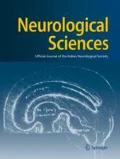Abstract
Anti-N-methyl-d-aspartate receptor (NMDAR) encephalitis has been recently identified as a fulminant encephalopathy, presenting with a variety of symptoms including behavioral change, amnesia and seizures suggesting cortical gray matter involvement. A 42-year-old woman presented with acute-onset clinical and magnetic resonance imaging (MRI) findings indicating brainstem and diencephalon involvement. Her neuropsychological examination revealed mild frontal dysfunction with no memory impairment. Detailed diagnostic workup proved negative except for serum/cerebrospinal fluid (CSF) NMDAR-antibodies and increased activity in inguinal and pelvic lymph nodes on positron-emission tomography (PET) examination. The symptoms and MRI findings completely resolved following steroid treatment. A 38-year-old woman presented with migraine-type headache and episodes of forgetfulness. Her brain MRI and neuropsychological examination were normal and diagnostic workup was unremarkable. N-methyl-d-aspartate receptor antibodies were identified in her sera and her symptoms spontaneously resolved within few months. Our cases suggest that anti-NMDAR encephalitis might present with minimal cognitive impairment, no apparent cortical gray matter involvement, a mild clinical course and without the classical clinical features of the disease.

References
Dalmau J, Tüzün E, Wu HY et al (2007) Paraneoplastic anti-N-methyl-d-aspartate receptor encephalitis associated with ovarian teratoma. Ann Neurol 61:25–36
Irani SR, Bera K, Waters P et al (2010) N-methyl-d-aspartate antibody encephalitis: temporal progression of clinical and paraclinical observations in a predominantly non-paraneoplastic disorder of both sexes. Brain 133:1655–1667
Dalmau J, Lancaster E, Martinez-Hernandez E et al (2011) Clinical experience and laboratory investigations in patients with anti-NMDAR encephalitis. Lancet Neurol 10:63–74
Vincent A, Irani SR, Lang B (2010) The growing recognition of immunotherapy-responsive seizure disorders with autoantibodies to specific neuronal proteins. Curr Opin Neurol 23:144–150
Shimazaki H, Morita M, Nakano I et al (2008) Inverse ocular bobbing in a patient with encephalitis associated with antibodies to the N-methyl-d-aspartate receptor. Arch Neurol 65:1251
Kurian M, Lalive PH, Dalmau JO et al (2010) Opsoclonus–myoclonus syndrome in anti-N-methyl-d-aspartate receptor encephalitis. Arch Neurol 67:118–121
Rubio-Agustí I, Dalmau J, Sevilla T et al (2011) Isolated hemidystonia associated with NMDA receptor antibodies. Mov Disord 26:351–352
Johnson N, Henry C, Fessler AJ et al (2010) Anti-NMDA receptor encephalitis causing prolonged nonconvulsive status epilepticus. Neurology 75:1480–1482
Maramattom BV, Philip C, Sundaram PS (2010) Idiopathic anti-NMDA-receptor encephalitis in a young Indian girl. Neurol India 58:671–672
Author information
Authors and Affiliations
Corresponding author
Rights and permissions
About this article
Cite this article
Tüzün, E., Türkoğlu, R., Yumerhodzha, S.M. et al. Anti-N-methyl-d-aspartate receptor encephalitis with minimal cortical impairment. Neurol Sci 34, 111–113 (2013). https://doi.org/10.1007/s10072-012-0934-z
Received:
Accepted:
Published:
Issue Date:
DOI: https://doi.org/10.1007/s10072-012-0934-z

